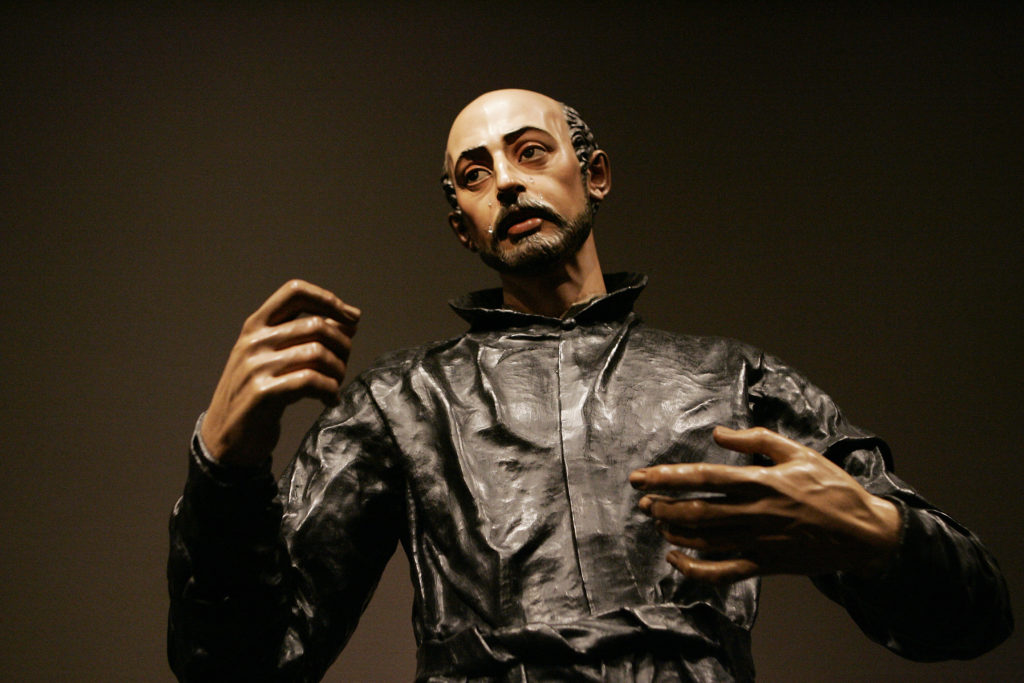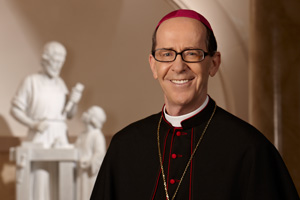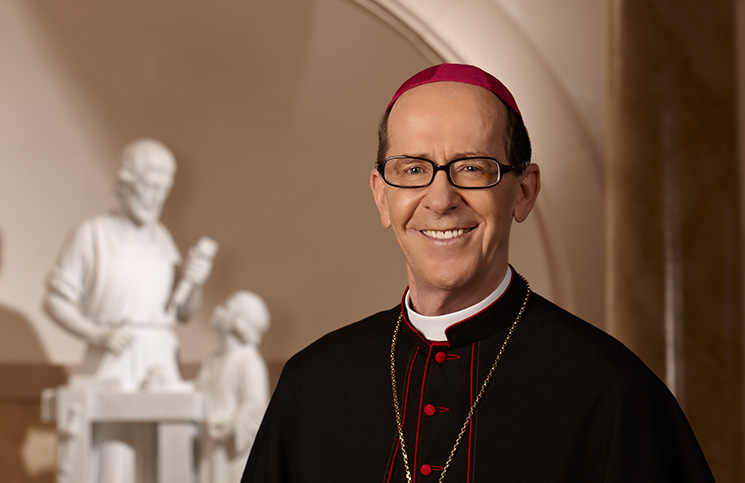
Seventh in a series


[dropcap type=”4″]T[/dropcap]he first religious community to have a fourth oath of availability to the pope is the Society of Jesus (the Jesuits), founded by St. Ignatius of Loyola and his companions. By God’s providence, we now have, for the first time in history, a pope who is Jesuit. It should come as no surprise, then, that Pope Francis would feel close to St. Ignatius and be greatly impacted by his life and teaching. As we draw near to the annual feast day of St. Ignatius, July 31, I invite you to join me in looking at what Pope Francis had to say to his fellow Jesuits on the Founder’s feast day in AD 2013.
De-center oneself so Christ can be there
In his Spiritual Exercises (a reliable guide for discerning God’s will), St. Ignatius, says the Holy Father, “puts us before our Lord Jesus Christ, our Creator and Savior (Cf. 6). And this leads us…to be ‘de-centered,’ to have before us ‘Christ always greater’…to ‘go out of our self-love, will and interest’ (Cf. 189). The question which is not taken for granted for us, for all of us, is: Is Christ the center of my life? Do I really put Christ at the center of my life? Because there is always the temptation to think that we are at the center.”
It is evident that the man previously known as Cardinal Jorge Bergoglio did not put his Jesuit spirituality behind when he was chosen to be the Successor of Peter. He continually strives to be a faithful companion of Jesus, never to take for granted what a privilege it is to hear the Lord say to us as He said to the Apostles at the Last Supper (Jn 15:15), “I no longer call you servants, I call you friends.”
A measure of how well we have de-centered ourselves in order to put Christ in the center is the priority we give to the Church. Pope Francis says, “To the centrality of Christ corresponds also the centrality of the Church: they are two fires that cannot be separated. I cannot follow Christ except in the Church and with the Church. … To serve Christ is to love this concrete Church, and to serve her with generosity and a spirit of obedience.”
Allow Christ to conquer you
God never abandons His people; He loves us and listens to us when we cry out to Him. On the other hand, it is wise for us, who are Christians, to abandon ourselves confidently to Him. Or as Pope Francis puts it, we need to allow Christ to conquer us.
Referring to the Spiritual Exercises by St. Ignatius, the Holy Father says, “To be conquered by Christ, to offer this King our whole person and our whole effort (96), to tell the Lord that we wish to do everything for His greater service and praise, to imitate Him also in enduring injuries, contempt, poverty (98)… To allow oneself to be conquered by Christ means to be ever outstretched to what is in front of me, towards the goal of Christ.”
St. Ignatius, having been a soldier for years, liked to employ terms from the battlefield. He pictured the Society of Jesus as the spiritual militia of the pope, with the whole world as its field of operations. Since he wanted the Jesuits to be strong in spiritual battle against the devil, he knew they, like the rest of us, needed to begin by surrendering completely to Christ our King. We need to allow Jesus to conquer our pride and stubborn will.
Feel shame for our sins
When Pope Francis was asked in an interview by a fellow Jesuit, “Who is Jorge Bergoglio?” he responded, “I am a sinner. This is the most accurate definition. It is not a figure of speech, a literary genre. I am a sinner…whom the Lord has looked upon.”
The Holy Father’s sense of self arises out of his rootedness in the Spiritual Exercises of St. Ignatius. By means of a daily examen, the founder of the Jesuits taught his brothers how to have both self-acceptance and self-accusation in order to be conscious of one’s own faults and thus motivated by the shame (which “stings the conscience”) to grow in virtue. With a focus on Christ, the orientation gives one clarity about how to please God and to gain eternal life.
Thus, on the Feast of this great saint, he told his fellow Jesuits, “…looking at Jesus, as Saint Ignatius teaches us in the First Week, especially looking at the crucified Christ, we feel that very human and very noble feeling that is shame, of not being up to the measure; we look at Christ’s wisdom and our ignorance, at His omnipotence and our weakness, at His justice and our iniquity, at His goodness and our malice (Cf. 59). To ask for the grace of shame, shame that comes from the continuous talk of mercy with Him, shame that makes us blush before Jesus Christ, shame that attunes us with the heart of Christ, who made Himself sin for me, shame that puts, in tears, our heart in harmony and accompanies us in the daily following of ‘my Lord’… this leads us always, as individuals and as Society, to humility, to live this great virtue.”
The path to friendship with Christ begins on the solid rock of repentance and faith; as Jesus told His first disciples (Mk 1:15), “Repent, and believe in the Gospel.” Knowing that this is a gift completely unearned, St. Ignatius, like St. Francis of Assisi and St. Paul of Tarsus before them, urges us to have the courage to confess our sins and to put all our trust in the mercy of God found in Jesus Christ.
Once we are rooted in the truth of who we are before God, i.e. sinners for whom Christ died on the Cross, then we are ready to dedicate ourselves as did St. Ignatius and Jesuits ever since “ad maiorem Dei Gloriam,” to the greater glory of God.






![[VIDEO] Make Sunday feel like Sunday again](https://www.catholicsun.org/wp-content/uploads/2021/04/2021-YOUTUBE-BISHOP-MESSAGE-THUMBNAIL-ENGLISH-218x150.png)